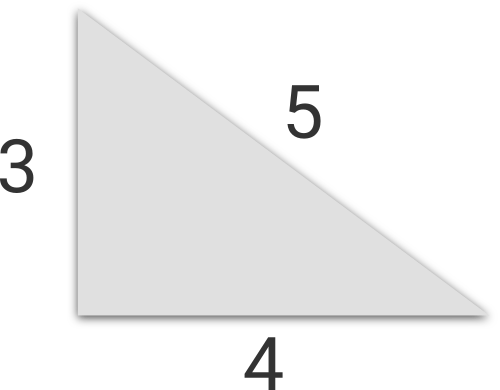Pythagorean Triples
Katya studies in a fifth grade. Recently her class studied right triangles and the Pythagorean theorem. It appeared, that there are triples of positive integers such that you can construct a right triangle with segments of lengths corresponding to triple. Such triples are calledPythagorean triples.
For example, triples (3, 4, 5), (5, 12, 13) and (6, 8, 10) are Pythagorean triples.
Here Katya wondered if she can specify the length of some side of right triangle and find any Pythagorean triple corresponding to such length? Note that the side which length is specified can be a cathetus as well as hypotenuse.
Katya had no problems with completing this task. Will you do the same?
The only line of the input contains single integer n (1 ≤ n ≤ 109) — the length of some side of a right triangle.
Print two integers m and k (1 ≤ m, k ≤ 1018), such that n, m and k form a Pythagorean triple, in the only line.
In case if there is no any Pythagorean triple containing integer n, print - 1 in the only line. If there are many answers, print any of them.
3
4 5
6
8 10
1
-1
17
144 145
67
2244 2245
#include <iostream> #include <cstdio> #include <cstdlib> #include <cmath> #include <algorithm> #include <climits> #include <cstring> #include <string> #include <set> #include <map> #include <queue> #include <stack> #include <vector> #include <list> #define rep(i,m,n) for(i=m;i<=n;i++) #define rsp(it,s) for(set<int>::iterator it=s.begin();it!=s.end();it++) #define mod 1000000007 #define inf 0x3f3f3f3f #define vi vector<int> #define pb push_back #define mp make_pair #define fi first #define se second #define ll long long #define pi acos(-1.0) #define pii pair<int,int> #define Lson L, mid, rt<<1 #define Rson mid+1, R, rt<<1|1 const int maxn=1e5+10; const int dis[4][2]={{0,1},{-1,0},{0,-1},{1,0}}; using namespace std; ll gcd(ll p,ll q){return q==0?p:gcd(q,p%q);} ll qpow(ll p,ll q){ll f=1;while(q){if(q&1)f=f*p;p=p*p;q>>=1;}return f;} int n,m,k,t; int main() { int i,j; ll p; scanf("%lld",&p); p=p*p; if(p&1) { ll ans1=(p-1)/2,ans2=ans1+1; if(ans1)printf("%lld %lld\n",ans1,ans2); else puts("-1"); } else { p/=2; if(p&1)puts("-1"); else { ll ans1=(p-2)/2,ans2=ans1+2; if(ans1)printf("%lld %lld\n",ans1,ans2); else puts("-1"); } } //system("Pause"); return 0; }







【推荐】编程新体验,更懂你的AI,立即体验豆包MarsCode编程助手
【推荐】凌霞软件回馈社区,博客园 & 1Panel & Halo 联合会员上线
【推荐】抖音旗下AI助手豆包,你的智能百科全书,全免费不限次数
【推荐】博客园社区专享云产品让利特惠,阿里云新客6.5折上折
【推荐】轻量又高性能的 SSH 工具 IShell:AI 加持,快人一步